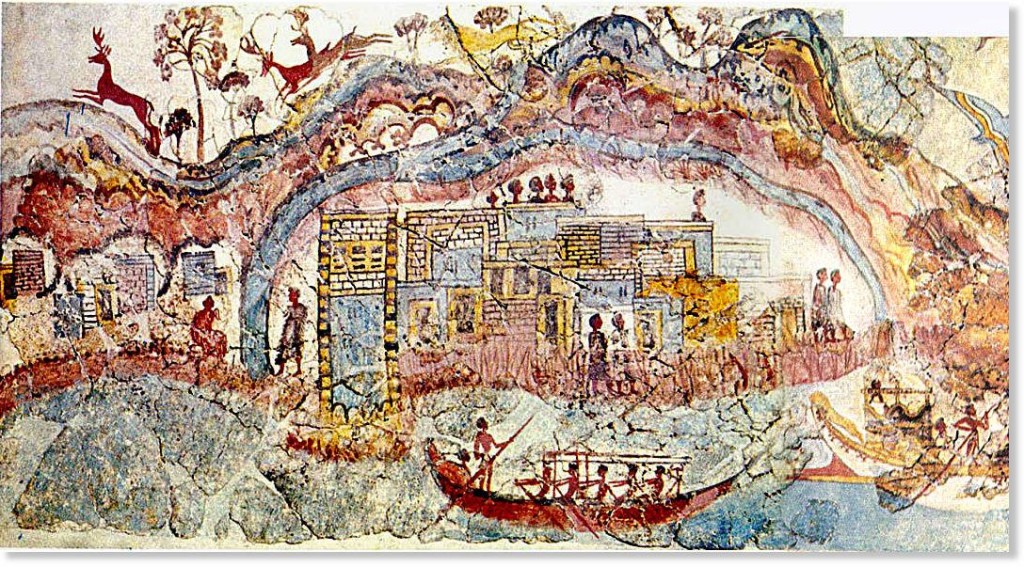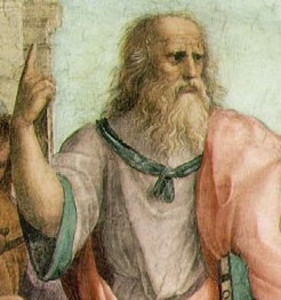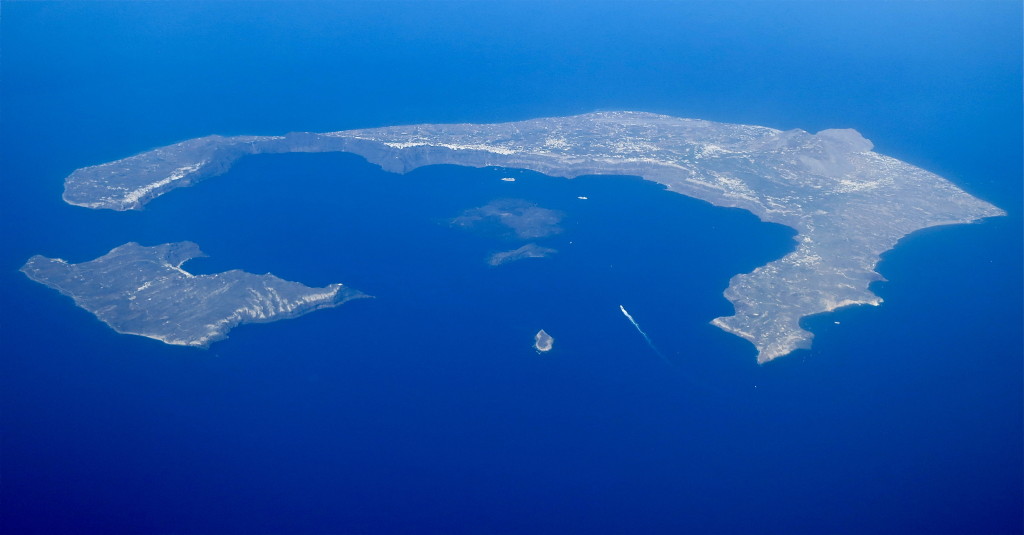
Plato described the nation of Atlantis in his dialogues Timaeus and Critias
In a previous article we discussed the legend of Atlantis and how the ancient philosopher Plato, left us clues to the rise and fall of this island civilization. It is in Timaeus and Critias, two of Plato’s later dialogues, that we learn about the the nation of Atlantis that existed peacefully for generation, and how it vanished beneath the waves after a failed invasion of Athens.
It is important to keep in mind that these essays by Plato are not historical texts, objectively verified and confirmed. In the same dialogue where Plato recounts the history of Atlantis, he also retells the story of the Phaëton, son of the god Helios, who drove a chariot of fire across the sky. It would be logical to assume that Atlantis is also myth. After all, it’s history is revealed to us by the character Critias who claims that his grandfather visited Egypt to meet with the the ancient Athenian law giver Solon. It is in Egypt that Solon reveals that the history of Atlantis is scrolled on an ancient piece of papyrus in hieroglyphs.
Essentially we are left with several thousand years worth of spoken history. It is a game of telephone that has been played throughout countless centuries. And we must simply take it on faith that Plato knew what he was talking about. It leaves most skeptical, if not completely assured that Atlantis is myth. However, there is still one hypothesis that challenges these doubts with real archaeological evidence, and points to a very real location to the lost civilization.

Santorini is a Greek island that rests atop an ancient caldera
The island of Santorini, classically known as the island of Thera, is a very real land mass located in the southern Aegean sea. Santorini exist now as a crescent shaped island with a massive lagoon surrounded by 300 foot high cliffs. It existed once as a large rectangular island before it was absolutely demolished by an ancient volcanic explosion some 900 or 1000 years before Plato wrote about the lost civilization.
This volcanic explosion would be later known as the Theran eruption. The giant crater that now forms the lagoon of Santorini is actually the remnants of an ancient underground caldera that collapsed after it’s earth shattering eruption thousands of years ago. It is hypothesized that this explosion created huge tsunamis that devastated the neighboring island of Crete and lead to the destruction of the ancient Minoan civilization. The land, and any civilizations, atop the caldera would have collapsed and sunk beneath the sea, just as Plato describes.

This fresco found in the ancient civilization of Akrotiri. It depicts and early Greek civilization that existed on the island before the volcanic eruption.
The idea that Santorini may have been the location of an ancient Atlantis gained currency in the 1960’s when excavation began on the small town of Akrotiri. Akrotiri is an ancient settlement on Santorini that was destroyed by the Theran eruption and subsequently covered in thick layers of dust and ash. When excavation began, archaeologists discovered perfectly preserved fresco’s that depicted the life of ancient Santorini.
When the ash was peeled away, pictures of ancient people fishing and navigating by boat were discovered. In the backdrop there is an island overrun with vegetation and wildlife, just as Plato described in his ancient texts. Could it be that these ancient fresco’s are the sole remaining evidence of an ancient Atlantis?
Even if it is believed that Santorini is the location of Atlantis, there are still several discrepancies between this island and the one described by Plato. For instance, Plato described that Atlantis existed 9,000 years before his lifetime. Also the island was said to have been more massive than Asia minor and Libya combined. How could Santorini be the island described by Plato? And even for this, there is an answer.
According to Plato, the story of Atlantis was handed down to the Greeks by the ancient Egyptians. It is hypothesized that a translation error would have lead the Greeks to believe that the Egyptian word for “hundred” actually meant “thousand”. If this is true ,then the destruction of Atlantis would have been only 900 years before Plato. Also, the size of Atlantis would have been shrunk considerably. If a translation error had occurred, the size of Atlantis would have been roughly the size of the crater on the modern island of Santorini.
Whether Atlantis was a real civilization, or if it was merely myth, is a matter of debate. There were several of Plato’s disciples who defended him fiercely and claimed that Atlantis was, in fact, real. A neo-platonist Proclus wrote a response to Timaeus, where he states:
“As for the whole of this account of the Atlanteans, some say that it is unadorned history, such as Crantor, the first commentator on Plato. Crantor also says that Plato’s contemporaries used to criticize him jokingly for not being the inventor of his Republic but copying the institutions of the Egyptians. Plato took these critics seriously enough to assign to the Egyptians this story about the Athenians and Atlanteans, so as to make them say that the Athenians really once lived according to that system.” -Proclus (disciple of Plato).
Still, it is more popular to believe that Atlantis is fictional and may have been inspired by the events on Santorini. Plato told his philosophy through story. he discussed his ideas through the lens of myth and legend. And while the idea of an Atlantis is tantalizing, it is much easier to believe that Plato invented it as a means to discuss ethics of an ideal civilization.
We will never know definitively, even the ending of Plato’s own writings remain a mystery. In Critias, Plato describes the eventual moral downfall of Atlantis. They were once a proud civilization however “…human nature got the upper hand”. Zeus would notice the decline of Atlantis and make plans to punish them. Plato writes:
“Zeus, the god of gods, who rules according to law, and is able to see into such things, perceiving that an honourable race was in a woeful plight, and wanting to inflict punishment on them, that they might be chastened and improve, collected all the gods into their most holy habitation, which, being placed in the centre of the world, beholds all created things. And when he had called them together, he spake as follows…” -Plato, from Critias
What Zeus said to the other gods, we will never know. The remaining text has been lost. Perhaps he devised a plan to sink Atlantis beneath the waves, punishment for their sins. We will never know what Plato’s final words were about the city of Atlantis. Much like the fabled civilization itself, the truth has been lost to the ages.












5 comments
My recently published book relates a new theory for the exact position of the Atlantis heartland that for the first time completely agrees with eveything that Plato wrote. I extracted 60 clues from his writings that could still possibly be verified today and they all match. Santorini barely agrees with 6. The region stretches westwards from Gibraltar all the way along Spain´s Costa da Luz and Portugal´s Algarve. Most of the original teritory now forms the seabed in front of this area.It has been endorsed by Graham Hancock and other experts. If you send me your email I can forward more details. The book is available in a USA hardback edition and UK paperback edition, both available from Amazon. Now, at last, serious research can be undertaken to see if Plato was telling the truth. The fact that he was indisputably describing somewhere that actually existed is indicative that maybe he was. Best wishes, Peter.
I’m afraid that you, who have written this article, nor Peter D., see clearly the intent of the tale of Atlantis. Neither of you understand Plato. There is something that does not meet the “eye” in Plato’s reason to convey the real meaning. Neither will anyone else get a glimpse at Atlantis, even using, as Socrates would say, the “mind’s eye.” No, one must think completely outside the box, way, way out… If one has not the “key” Atlantis will not be found, although, one day, it will find us. Look to the opening of the Timaeus, there the road to finding Atlantis begins. “One, two, three; but where, my dear Timaeus, is the fourth of those who were yesterday my guests and are to be my entertainers to-day?” Unless this fourth is found, there is no way of heading in the right direction for ever getting to Atlantis.
As far as those 60 clues that Peter is alluding to, I saw the episode on the History Channel. To tell the truth, Giorgio Tsoukalos’ far out conclusion of Atlantis having been a large alien spaceship would be closer to the truth than Peter’s assumption of having found Atlantis. Let anybody that is seriously contemplating the tale of Atlantis stick to the “facts” and “logic” as stated by Plato; all of them, and not just one or 10, or 60. It’s 100% or “no cigar.” Selling books and television shows is just for fun and for making a few bucks; nothing serious in any of them, to date. Again, as Socrates would say, anyone will need a great deal of indulgence before they find this Atlantis. Perhaps someone, one day, before Atlantis finds us, will be blessed and inspired and therefore, able to tell all of us the truth. Perhaps one day, God willing.
To conclude, and so that no one has the wrong idea, I will semi-quote Socrates once more. “I’m not myself at all wise, nor have I anything to show which is going to locate Atlantis.” “But I do have this knack for inspecting and abstracting, and then exposing the conception which anyone has formed about having identified a possible location for Atlantis is a vain shadow.”
I agree with the author that that the explosion of Thera is the most probable candidate for the Lost Civilization of Thera.
It was cataclysmic and, as noted, ended the Minoans and surely reverberated and affected the entire region–felt by both mainland Greece and Asia Minor, and such a catastrophe–like The Flood of Noah/Deucalion/Gilgamesh–was powerful enough to implicate the gods and develop into myths not many generations removed from the actual event, and inspire elaborations before It was even inscribed into Egyptian hieroglyphics (assuming that part is true).
Then–assuming that Solon was the source–they had to be read by or interpreted to him, and the detailed description–including its location–then had to migrate to Greece–in Greek–in a perfect, uncorrupted state and perfectly recalled by Plato for the Atlantis material to be considered a historic report worthy of Herodotus (at best).
But that would be highly unlikely, and so the question is whether there is some truth behind the legend–and I think there is and it refers to Thera–or if Plato just made it up (out of whole cloth? Don’t be think so).
Hello. I just submitted a comment–with typos! (Auto-correct on iPhone).
Please repair if approved.
1st Paragraph:
“I agree with the author that that..” (Remove one “that”)
Last sentence:
“Don’t be think so.”
Should be: “I don’t think so.”
Sorry! Thank you.
Merry Christmas!
“…the Lost Civilization of Thera.”
(Should be “The Lost Civilization of Atlantis”)
The interpretation presented above relies completely on a literally reading of the text. The big question is whether this really makes sense. Because we do not read any other ancient text literally, only just to say then: Oh, it cannot be true. E.g. when Herodotus says that Egypt is 11,340 years old (and older), nobody says that Egypt does not exist. Everybody says that Herodotus somehow screwed it up.
The same historical-critical approach is valid for Plato’s Atlantis, too. The 9,000 years of Atlantis fit perfectly into the wrong idea of the Greeks that Egypt is 11,000 years old and older. And yes, Atlantis allegedly is a story from Egypt, so it is surely the same mistake, even if it is an invention by Plato!
No ancient Greek said: Hey, these 9,000 years, this does not sound credible. Because they believed in an age of Egypt of 11,000 years. Only the Christians were the first to develop doubts of the Atlantis story because of the 9,000 years, because some Christians (not all) believed in an age of the world of only 6,000 years.
Long story short: The Atlantis story could indeed refer to a real place, but it looked differently than the literal description tells us. Find more about the historical-critical approach and which scientists worked with it here: https://www.Atlantis-Scout.de/
Our apologies, you must be logged in to post a comment.